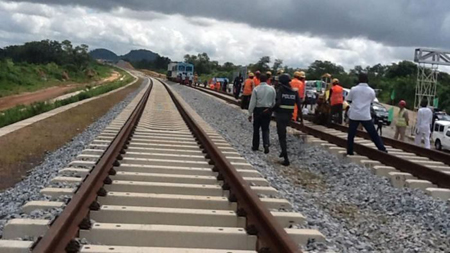The Lagos-Ibadan Standard Gauge, which took off ithis month, was just one of the many initiatives that may shape 2021 and change the nation’s transportation narratives.
The deleterious effects of the second wave of COVID-19 notwithstanding, 2021 promises to be a year of consolidation on the various initiatives meant to change the nation’s transportation narrative.
One of such that would be delivered this month is the $1.7 billion Lagos-Ibadan Standard Gauge, (known as the Lot II of the Lagos-Kano Standard Gauge).
The foundation-laying, which was conducted by the Acting President Prof Yemi Osinbajo (as he then was), on March 7, 2017, is being projected to be inaugurated by President Muhammadu Buhari as a New Year gift to the nation.
The LOT II, which was done and dusted within three years, (the first of such gargantuan project to have been conducted in record time), is perhaps the stimulant that the Buhari administration needed to embark on other ambitious projects aimed at linking all the state capitals with rail system of transportation before 2023.
Among the rail system waiting to be activated by the government under the supervision of Rotimi Amaechi, the Minister of Transportation, are the Ibadan-Kano Standard Gauge (LOT III), and the Kaduna-Katsina-Maradi (Niger Republic Border) line, either of which Amaechi said may begin as soon as the LOT II, is delivered.
The minister added further that the government is shopping for fresh funds to take on the Lagos-Port Harcourt coastal line, as well as the 1,657 kms Port Harcourt-Maiduguri line (known as the Eastern line), as well as the Itakpe-Ajaokuta-Abuja line, which may be executed on a Public-Private Partnership (PPP) format.
Much activity is expected this year on the railway assembly plant at Kajola, Ogun State, kicked off by Osinbajo in November 2019, and the University of Transportation, Daura, (inaugurated by Buhari in December of the same year), scheduled to begin academic activities next year.
While the Assembly plant is expected to feed the Nigerian and the African markets of the railway hardware needs to have a healthy railway system, no fewer than 150 Nigerians are in various universities in China, on scholarship, in various aspects of railway engineering, to teach Nigerians on railway logistics and various aspects of engineering relevant to the railway system.
Both projects, according to the minister, are donations from the contractor – China Civil Engineering Construction Corporation (CCECC) – to the growth and development of the railway system in the country.
Though experts said Nigeria may need between N2 and N3 trillion to bridge the railway infrastructure gaps in the country, the Federal Ministry of Transportation has just N205 billion in the 2021 budget.
Amaechi said the budget is barely enough to fund ongoing projects and the overheads of all its related agencies.
The minister said out of the N205 billion, land transport (the railway project), would gulp about N204 billion, marine transport N845 million, and overhead cost in 2021 put at N358 million.
The minister, at another forum, said the Lagos-Ibadan speed train would create no fewer than 10,000 direct jobs and hundreds of secondary jobs, while the Kajola Assembly Plant and the tertiary institution are scheduled to also create additional jobs opportunities.
The freight element of the completed Lagos-Ibadan speed train would, undoubtedly, have tremendous effects on the travel pattern by reducing the traffic gridlock in and around the highways and inner city roads in Lagos State.
When fully on stream, both the narrow and standard gauge rail lines are meant to freight containers from the Apapa Ports to the Dry Port in Ibadan, where importers would now evacuate their cargoes, thereby relieving Lagos roads.
Just as transportation is expected to continue on a bullish ride, with the rail system emerging as a major artery of the nation’s transportation architecture the new year, more states across the federation are also expected to consolidate on their strides in inter-modal transportation initiatives and bequeathe to the people a new transportation experience.
One such state from, which much is expected in the transportation ecosystem is Lagos, where the second flagship light rail project – called the Red Line Light Rail that would run from Ijoko to Iddo, using the existing Federal Government’s rail corridor, is expected to gain more momentum in the year.
The Red Line, as well as the Blue Line, which had been in the works since 2006, are slated to be completed next year.
The Red Line, among others, is slated to have three flyover bridges, four over passes, and four railway stations. It would run parallel to the Federal Government’s Standard Gauge. It is expected that while the state would build four overpasses, the Federal Government would build the remaining four.
The Lagos State supervising agency – Lagos Metropolitan Transport Authority (LAMATA) – at the various community engagements last month said the Babajide Sanwo-Olu administration has already earmarked the funds for the project, adding that the project would not suffer hitches until it is delivered next year.
Giving more technical details, LAMATA’s Director Rail Transport Olasunkanmi Okusaga, said the proposed gauge for the 37 km red line is 1435m and the line, when completed, would carry 750,000 passengers daily at inception and 1.1 million daily, when fully operational.
The Commissioner for Transportation, Dr Frederic Oladeinde, said the rail system is part of efforts aimed at developing alternative modes of transportation that would de-emphasise on the road as the major element accounting for the movement of commuters.
He said just as the roads rehabilitation, roads expansion and junction improvements are being aggressively pursued, the government is also developing the waterways and the rail system in other to promote inter-modality which would bring much relief to the people in line with the THEMES agenda of the government, which seeks efficient traffic management and transportation.
Similar aggressive investment is being expected on the waterways with the government investing in acquisition of modern ferries and the cleaning and channellisation of the waterways, with which the state is abundantly blessed.




